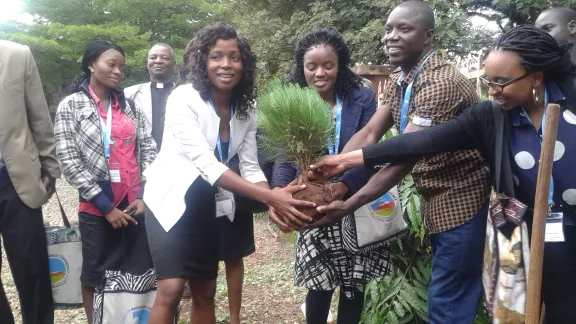
Global Young Reformers Network members plant a tree during an exposure visit to Majengo Parish in Moshi, Tanzania. From left: Sam Ofonime (Nigeria), Rev. Helvi Muremi (Namibia), Anderson Cooper (Liberia) and Sikhanyiso Mhaka (Zimbabwe). Photo LWF/Allison Westerhoff
Allison Westerhoff, a communications officer with the Lutheran church in Southern Africa, applauds efforts to encourage young church members in Tanzania to think green.
The Majengo Lutheran Parish in Moshi, Tanzania, is a rapidly growing congregation that is taking action to improve the local environment. Each confirmand must plant six trees before they can graduate. The reason for this initiative is in response to the erosion that was occurring next to a river that runs by the Majengo Parish. During an exposure visit, the Global Young Reformers Network (GYRN) and other global Lutheran leaders visited the Majengo Parish to plant their own trees among the confirmands’ trees.
“Planting the trees was rejuvenating! I had never planted a tree before, so it was really fun,” reflected Ditebogo Lebea, a member of the GYRN and representative from South Africa. “I learned that it is the small things that turn into the big things.”
The GYRN is focused on raising awareness on climate justice and giving back to the earth in light of the theme, “Creation Not For Sale.” Lebea hopes to bring back this lesson to her home community in Johannesburg, South Africa. She wants to begin doing the little things that make a difference including tree planting and participating in the ACT Climate Justice campaign of “Fast for the Climate.” Lebea believes people are aware of the impact they have on the environment, but are ignorant of the consequences.
Many farmers who live near the river in Moshi town have chopped down trees to plant crops, which causes the soil to be weak and break away. The soil and land around the river is very rich and easy to till which is ideal for crops, but not for preventing erosion. The participants were able to not only see the impact first hand but were also helping by planting their own trees. In remembrance of this conference, and the visit to the Majengo Parish, three trees were planted to represent the three Lutheran Communion sub-regions: Central and Western Africa (LUCCWA), Central and Eastern Africa (LUCCEA), and Southern Africa (LUCSA).
“I was happy to be involved and to be able to help,” said Amos Adjei, another GYRN member and representative from the Evangelical Lutheran Church of Ghana. “I will remember that we were here, and we made an impact,” he says, “I will take all that I learned and develop it when I am back home.”
The senior pastor Rev. James Nkya explained to the participants that the congregation has grown so much that they are now expanding the church building to hold more than 1,000 people. There are many youth in Moshi town, and the Majengo parish has a total of 300 confirmands this year alone. Pastor Nkya ensures that matters of the environment are included in the congregations’ focus, especially as members continue to grow beyond their church buildings capacity.
Allison Westerhoff is a member the Africa Lutheran Information and Communication Network (ALCINET) and works as a Communications Officer for LUCSA.
Caption:
Global Young Reformers Network members plant a tree during a visit to Majengo Parish in Moshi, Tanzania. From left: Sam Ofonime (Nigeria), Rev. Helvi Muremi (Namibia), Anderson Cooper (Liberia) and Sikhanyiso Mhaka (Zimbabwe). Photo LWF/Allison Westerhoff
The views expressed in this blog are those of the author, and not necessarily representative of Lutheran World Federation policy.


